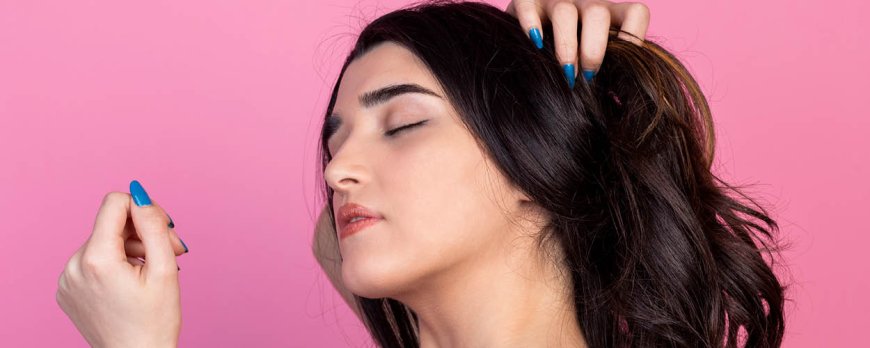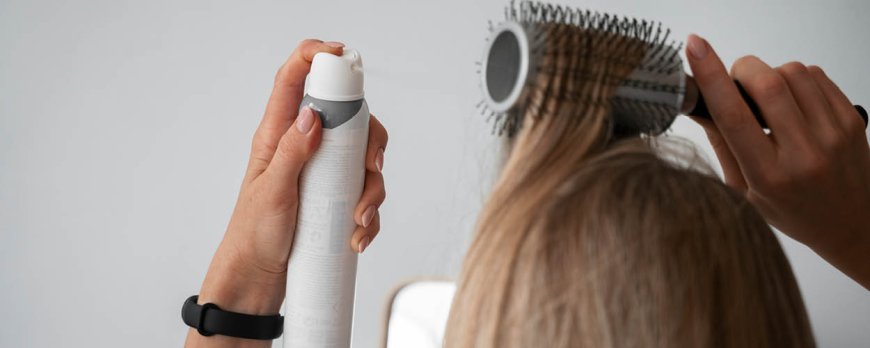How long does it take for hair to grow?
Uncover the mystery of hair growth with our comprehensive guide that answers, 'How long does it take for hair to grow?'. Dive in for fascinating insights!

How long does it take for hair to grow?
Hair growth is a fascinating process that varies in duration for each individual. On average, hair grows about half an inch per month or six inches per year. However, this growth rate can be influenced by factors such as hair type and overall health.
Key Takeaways:
- On average, hair grows about half an inch per month or six inches per year.
- Factors such as hair type and overall health can affect hair growth.
- While it is debatable whether you can speed up hair growth, there are steps you can take to promote healthy hair growth.
- Using conditioning treatments and bond strengthening systems can support hair growth.
- It's important to use a heat protectant when styling with heat tools to minimize damage to the hair shaft.
Understanding the Hair Growth Cycle
The hair growth cycle consists of various stages that contribute to the overall duration of hair growth. Understanding these stages can help shed light on the intricate process of how hair grows and regenerates itself.
The first phase of the hair growth cycle is called anagen, which is the active growth phase. During this phase, the cells in the hair follicles divide rapidly, leading to the production of new hair. On average, the anagen phase lasts between two to six years, but this duration can vary among individuals.
Next comes the catagen phase, which is a transitional phase that lasts for about two weeks. During this time, the hair follicles shrink and detach from the blood supply, preparing for the next phase.
The final phase of the hair growth cycle is called telogen, also known as the resting phase. During telogen, the hair follicles are dormant and the old hair eventually sheds, making room for new hair to grow. This phase typically lasts for about three months before the cycle repeats itself.
The Hair Growth Cycle in Summary:
- Anagen phase: The active growth phase where new hair is produced.
- Catagen phase: The transitional phase where the hair follicles shrink and detach from the blood supply.
- Telogen phase: The resting phase where old hair sheds and new hair prepares to grow.
It's important to note that each hair follicle goes through the growth cycle independently, which is why you may see different hairs on your head at different stages of the cycle.
Now that we have a better understanding of the hair growth cycle, we can explore ways to promote healthy hair growth and maintain overall hair health. Stay tuned for the next sections where we delve into the average hair growth rate, factors affecting hair growth, and practical tips for faster hair growth.

Average Hair Growth Rate
On average, hair grows at a rate of half an inch per month, resulting in approximately six inches of growth per year. This growth rate, however, can vary slightly depending on factors such as hair type and overall health.
While it is debated whether it is possible to speed up hair growth, there are steps you can take to promote healthy hair growth. Conditioning treatments can help improve the overall health and strength of your hair, which in turn can support better growth. Switching to bond strengthening systems can also assist in enhancing hair growth by fortifying the hair structure.
When using heat tools to style your hair, it is crucial to protect it from heat damage. Using a heat protectant spray or serum can minimize the impact of heat on your hair shaft, allowing it to grow in a healthy manner.
In addition to conditioning treatments and heat protection, certain hair care products can aid in promoting hair growth. Hair oils, such as argan oil, can help nourish the hair follicles while providing natural moisture. Vitamins and supplements, like biotin, can also support overall hair health and growth.
If you are experiencing significant hair loss or slow regrowth, it is important to consult with a dermatologist or hair loss specialist. They can provide personalized advice and recommend medically-approved treatments, such as minoxidil, that are suitable for your specific condition. Seeking professional advice is crucial in addressing any underlying causes and finding the most effective solutions for your hair growth concerns.
Factors Affecting Hair Growth
Several factors can impact the rate and quality of hair growth, including genetic predisposition and external influences. Here are some key factors to consider:
- Genetics: Your genetic makeup plays a significant role in determining your hair growth rate and pattern. Some individuals naturally have faster-growing hair, while others have slower growth.
- Hormonal Changes: Hormonal fluctuations can affect hair growth. For example, during pregnancy, many women experience thicker and faster-growing hair due to increased estrogen levels. On the other hand, certain hormonal imbalances, such as those caused by thyroid disorders, can lead to hair loss or slow growth.
- Age: As we age, our hair growth tends to slow down. The hair follicles may become less active, leading to thinner and slower-growing hair.
- Nutritional Deficiencies: A lack of essential nutrients, such as vitamins A, B, C, D, and E, iron, and biotin, can hinder hair growth. It's important to maintain a balanced diet to ensure your hair follicles receive the necessary nutrients for healthy growth.
External Influences: Environmental factors and styling practices can also impact hair growth. Excessive heat styling, tight hairstyles, and chemical treatments can lead to hair breakage and damage, hindering the overall growth process.
While these factors can affect hair growth, it's important to remember that individual experiences may vary. If you're concerned about your hair growth or experiencing significant hair loss, it's recommended to consult with a dermatologist or hair loss specialist for personalized advice and treatment options.

Tips for Faster Hair Growth
While you can't drastically speed up hair growth, there are certain habits and natural remedies that may help promote healthier and faster-growing hair. Here are some tips to consider:
- Maintain a healthy diet: Eating a balanced diet rich in essential nutrients, such as vitamins A, B, C, and E, as well as biotin and iron, can support hair growth. Include foods like eggs, fish, nuts, leafy greens, and berries in your meals.
- Handle hair gently: Avoid harsh brushing or combing, especially when your hair is wet, as this can cause breakage. Use a wide-toothed comb or a brush with soft bristles to detangle hair from the ends upwards.
- Avoid heat damage: Excessive heat styling can weaken the hair and hinder growth. Whenever possible, let your hair air dry and limit the use of hot styling tools. If you must use heat, apply a heat protectant spray or serum to minimize damage.
- Try natural hair growth remedies: Some natural ingredients, like castor oil, coconut oil, and aloe vera, are believed to promote hair growth. Apply these oils or extracts to your scalp and hair, leave them on for a few hours or overnight, and then wash as usual.
Incorporating these tips into your hair care routine may help create a healthier environment for hair growth. However, it's important to remember that individual results may vary, and it's best to consult with a dermatologist or hair loss specialist if you have concerns about significant hair loss or slow regrowth.

Conditioning Treatments and Bond Strengthening Systems
Regular conditioning treatments and the use of bond strengthening systems can contribute to healthier hair, which in turn may support better hair growth. Conditioning treatments help nourish and hydrate the hair, improving its overall strength and resilience. They can also help repair damage from heat styling, chemical treatments, and environmental factors.
When choosing a conditioning treatment, look for those that contain ingredients like keratin, collagen, or natural oils such as argan or coconut oil, which can help restore moisture and strengthen the hair shaft. These treatments can be applied after shampooing and left on for a few minutes before rinsing to maximize their effectiveness.
Benefits of Conditioning Treatments:
- Improves hair elasticity and strength
- Reduces breakage and split ends
- Enhances shine and smoothness
- Helps maintain moisture balance
In addition to conditioning treatments, incorporating bond strengthening systems into your hair care routine can provide additional benefits. Bond strengthening systems work by reinforcing the protein bonds within the hair, making it more resistant to breakage and damage. They can help protect the hair from the stress caused by chemical treatments, heat styling, and environmental aggressors.
Bond strengthening systems typically consist of a two-step process: a bond builder and a bond sealer. The bond builder helps repair and strengthen the hair shaft, while the bond sealer locks in the benefits and provides long-lasting protection.
Advantages of Bond Strengthening Systems:
- Strengthens and fortifies the hair
- Reduces breakage and damage
- Preserves hair color and vibrancy
- Improves manageability and styling options
By regularly using conditioning treatments and bond strengthening systems, you can improve the overall health and strength of your hair, creating a favorable environment for better hair growth. These treatments, along with other healthy hair habits, such as protecting your hair from heat damage and maintaining a balanced diet, can contribute to the appearance and feel of thicker, longer, and healthier hair.
Heat Protectant and Styling Tools
Using heat protectant products and being mindful of heat styling tools can help prevent damage and preserve the integrity of the hair, supporting its growth. Here are some tips to protect your hair while using heat styling tools:
- Apply a heat protectant spray or serum to your hair before using heat styling tools. This creates a barrier between the heat and your strands, minimizing the potential damage.
- Set your heat styling tools to a lower temperature. High heat can damage the hair, so it's best to use a lower setting whenever possible.
- Avoid using heat styling tools on wet or damp hair. Excess moisture in the hair can make it more susceptible to damage from heat.
- Limit the use of heat styling tools. Overusing heat on your hair can lead to dryness, breakage, and hinder hair growth. Try to give your hair a break from heat styling whenever possible.
By following these tips, you can minimize the damage caused by heat styling tools and promote healthy hair growth. Remember, it's important to listen to your hair's needs and give it the care it deserves to thrive.

Hair Oils, Vitamins, and Supplements
Hair oils, vitamins, and supplements are often used as a means to enhance hair growth and strengthen the hair shaft. These natural remedies can provide nourishment to the hair follicles, helping to promote healthy growth from the roots. Argan oil, for example, is rich in essential fatty acids and antioxidants that can deeply moisturize the hair, reduce breakage, and improve overall hair health.
In addition to oils, certain vitamins and supplements can also play a role in maintaining healthy hair. Biotin, a B-vitamin, is widely known for its potential benefits in supporting hair growth. It helps to strengthen the hair strands and improve their elasticity. Other vitamins, such as vitamin E and vitamin D, can also contribute to the overall health of the hair and scalp.
When considering the use of hair oils, vitamins, and supplements, it is important to consult with a healthcare professional or dermatologist. They can provide personalized recommendations based on your specific needs and help you determine the right dosage and frequency of use. It's also important to note that while these remedies can support healthy hair growth, results may vary for each individual. Consistency and patience are key when incorporating these products into your hair care routine.
In conclusion, hair oils, vitamins, and supplements can be valuable additions to your hair care regimen. They can help nourish the hair follicles, strengthen the hair shaft, and promote optimal hair growth. However, it's important to consult with a professional to ensure you are using the right products and following a safe and effective approach.
Medically-Approved Hair Loss Treatments
In some cases of significant hair loss or slow regrowth, medically-approved treatments like minoxidil may be recommended by a professional. Minoxidil is an FDA-approved topical solution that can help stimulate hair growth and slow down hair loss. It works by increasing blood flow to the hair follicles, prolonging the anagen (growth) phase of the hair cycle.
Here are some key points to know about minoxidil:
- Effectiveness: Minoxidil has shown to be effective in promoting hair growth, particularly in individuals experiencing androgenetic alopecia (male pattern baldness) or female pattern hair loss.
- Application: Minoxidil is typically applied directly to the scalp twice a day. It's important to follow the instructions provided by your healthcare provider to ensure proper usage.
- Results: Hair growth with minoxidil may take several months to become noticeable. It's important to be patient and consistent with your usage to achieve the best results.
- Side Effects: Like any medication, minoxidil may have potential side effects, such as scalp irritation, dryness, or increased hair shedding initially. These side effects are usually temporary and subside with continued use.
If you're considering using minoxidil or any other medically-approved hair loss treatment, it's crucial to consult with a dermatologist or hair loss specialist. They can evaluate your specific situation, diagnose any underlying causes of hair loss, and recommend the most appropriate treatment plan for you. They can also provide guidance on how to incorporate minoxidil into your hair care routine and address any concerns or questions you may have.
Seeking Professional Advice
If you are concerned about your hair growth or experiencing abnormal hair loss, it's crucial to consult with a dermatologist or hair loss specialist for a proper assessment and guidance. These professionals have the knowledge and expertise to determine the underlying causes of your hair concerns and recommend the most appropriate treatments or solutions.
During a consultation, a dermatologist or hair loss specialist will carefully examine your scalp and hair to assess the extent of the issue and identify any underlying conditions that may be contributing to your hair loss or slow regrowth. They may also ask questions about your medical history, lifestyle factors, and hair care routine to gain a comprehensive understanding of your unique situation.
Advantages of Professional Advice:
- Accurate Diagnosis: Dermatologists and hair loss specialists can provide an accurate diagnosis by identifying the specific cause of your hair loss or slow hair growth.
- Customized Treatment Plan: Based on their assessment, they can develop a personalized treatment plan tailored to your needs and goals.
- Access to Medical-grade Treatments: These specialists have access to advanced medical treatments, such as minoxidil, that may be more effective in addressing hair loss.
- Expert Guidance: Professionals can offer expert guidance on lifestyle modifications, dietary changes, and appropriate hair care practices to optimize hair growth.
- Peace of Mind: Consulting with a professional can provide peace of mind and assurance that you are taking the necessary steps to address your hair concerns.
Remember, seeking professional advice is crucial for understanding and addressing hair loss or slow hair growth effectively. So, don't hesitate to schedule a consultation with a dermatologist or hair loss specialist to receive proper assessment and guidance.
Conclusion
Understanding the factors influencing hair growth and adopting healthy hair care habits can contribute to maintaining luscious locks that grow at their natural pace. On average, hair grows about half an inch per month, or six inches per year. This growth rate can vary slightly depending on factors such as hair type and overall health.
While there is debate over whether it is possible to speed up hair growth, there are steps you can take to promote healthy hair growth. Using conditioning treatments can improve the overall health and strength of your hair, leading to better growth. Switching to bond strengthening systems can also enhance hair growth by fortifying the bonds within the hair shaft.
When styling your hair with heat tools, it is crucial to use a heat protectant to minimize damage to the hair shaft and promote healthy growth. Additionally, incorporating hair care products like hair oils, vitamins and supplements, and medically-approved treatments like minoxidil can support hair growth by nourishing the hair follicles and addressing specific concerns.
If you are experiencing significant hair loss or slow regrowth, it is important to consult with a dermatologist or hair loss specialist. They can provide personalized advice and treatment options tailored to your specific needs. By seeking professional help, you can address underlying issues and take proactive steps towards maintaining healthy hair growth habits.
FAQ
How long does it take for hair to grow?
On average, hair grows about half an inch per month, or six inches per year.
What factors can affect hair growth?
Hair growth can be influenced by factors such as genetics, age, hormonal changes, nutritional deficiencies, and certain medical conditions.
Can I speed up hair growth?
While there is debate over whether it is possible to speed up hair growth, there are steps you can take to promote healthy hair growth, such as using conditioning treatments, switching to bond strengthening systems, and using heat protectant when styling with heat tools.
How can I promote faster hair growth naturally?
Maintaining a healthy diet, using gentle hair care practices, avoiding heat damage, and incorporating hair growth-boosting ingredients, such as biotin and castor oil, may help promote faster hair growth naturally.
Are there any treatments or products that support hair growth?
Certain hair care products like hair oils, vitamins and supplements, and medically-approved treatments like minoxidil can support hair growth. It's important to consult with a dermatologist or hair loss specialist if you are experiencing significant hair loss or slow regrowth.


































































































































